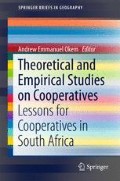Abstract
Coffee cooperative associations were the most important channels through which coffee farmers used to sell their commodities as well as receiving various forms of government assistance before the adoption of the market liberalisation policies in Cameroon . These forms of support included extension services, subsidies and in some cases social services such as healthcare and education. With the adoption of the liberalisation policies, the coffee commodity chain shifted from a chain regulated by the heavy hand of the state to the current one regulated by market forces. One of the key consequences was that this shift contributed to the collapse of the majority of coffee cooperatives. This chapter investigates the factors that contributed to the fall of the coffee cooperatives in the post liberalisation period in Cameroon . It argues that although the proximate causes of the collapse of the agricultural cooperatives can be attributed to the country’s macroeconomic policy shift from pre-adjustment to the post-adjustment period, the nature of the cooperative system as ‘government institutions’ in the pre-liberalised economy was its original sin that predisposed newly established cooperatives to an eventual collapse. As such, it is understandable that coffee cooperatives fell with government withdrawal from the economy after the country’s adoption of the IMF- and World Bank-imposed neoliberal macroeconomic policies.
Access this chapter
Tax calculation will be finalised at checkout
Purchases are for personal use only
Notes
- 1.
The French acronym UCCAO stands for Union Centrale des Coopératives Agricole de L’Ouesttranslated as the central cooperative for agricultural cooperatives of the Western Region. Headquartered in Bafoussam the capital city of the Western Region of Cameroon, UCCAO is the umbrella body for mainly coffee cooperatives that is comprised of six major cooperatives (CAPLAMI, CAPLAME, CAPLAMBAM, CAPLANOUN, CAPLAHN, and CAPLANDE) located in the main town in the Mifi, Menoua, Bamboutos, Noun, Haut Nkam, and Nde Divisions.
References
Champaud, J. (1969). Cooperatives et development: L’U.C.C.A.O. Les Cahiers D’Outre-Mer, Tome XXII, 55, 95–100.
Gellar, S., Oakerson, R. & Wynne, S. (1990). An institutional analysis of the production, processing, and marketing of arabica coffee in the west and north west province of cameroon, Decentralization, Finance and Management Project (DFM).
Jara, M. K., & Satgar, V. (2008). International cooperative experiences and lessons for the eastern cape cooperative development strategy: A literature review, Cooperative and Policy Alternative Centre, Eastern Cape Socio Economic Consultative Council (ECSECC) Working Paper No. 2.
Muenkner, H. H., & Shah, A. (1993). Creating a favourable climate and conditions for cooperative development in Africa. Geneva: International Labour Organization.
Ortmann, G. F., & King, R. P. (2007). Agricultural cooperatives I: History. Theory and problems. Agrekon, 46(1), 40–68.
Satgar, V. & William, M. (2008). The Passion of the People: Successful Cooperative experiences in Africa. Johannesbourg: COPAC.
World Bank (2010). Cameroon coffee supply chain risk assessment, Draft report, All ACP agricultural commodities programme.
Author information
Authors and Affiliations
Corresponding author
Editor information
Editors and Affiliations
Rights and permissions
Copyright information
© 2016 The Author(s)
About this chapter
Cite this chapter
Momo-Lekane, G. (2016). Coffee Cooperatives in Cameroon: An Assessment of the Causes of Coffee Cooperatives’ Collapse in the Post-adjustment Period. In: Okem, A. (eds) Theoretical and Empirical Studies on Cooperatives. SpringerBriefs in Geography. Springer, Cham. https://doi.org/10.1007/978-3-319-34216-0_6
Download citation
DOI: https://doi.org/10.1007/978-3-319-34216-0_6
Published:
Publisher Name: Springer, Cham
Print ISBN: 978-3-319-34215-3
Online ISBN: 978-3-319-34216-0
eBook Packages: Earth and Environmental ScienceEarth and Environmental Science (R0)

